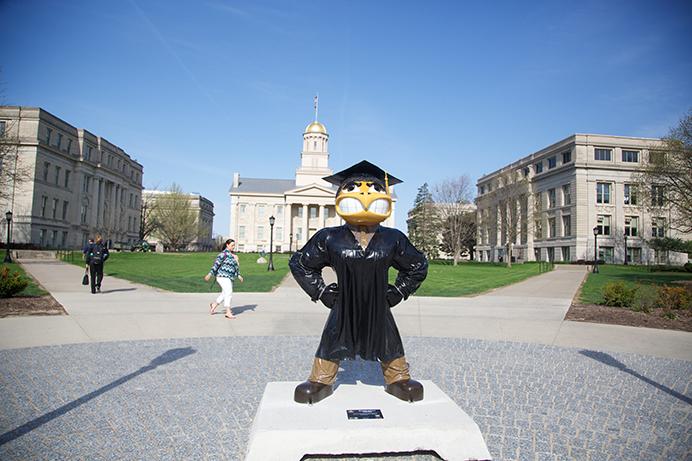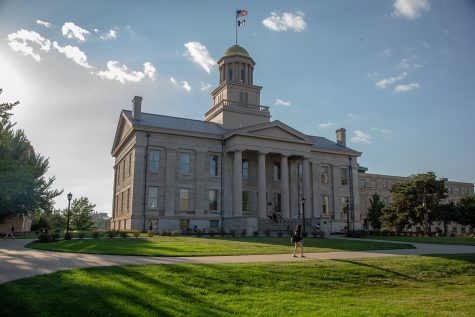Opinion: One-size-fits-all doesn’t suit first-gen students making post-grad plans
Understanding the unique struggles facing first-generation students can help the UI better prepare them for the future.
University of Iowa mascot Herky the Hawkeye goes back out On Parade for the 10th Anniversary of Herky on Parade on Monday, May 5, 2014.
December 5, 2019
My dad — like many fathers — doesn’t cry often. I can count on one hand the number of times I’ve seen tears escape his eyes, and typically only after a tragedy.
But seated one evening months ago at an Applebee’s in suburban Illinois, as we waxed nostalgic about my mostly complete college journey, he brought up my future graduation ceremony — the day he and my mother, who both were never afforded the opportunity to receive a college education, will witness their one and only child achieve their unfulfilled ambitions.
Thinking about when he and my mom will sit proudly inside Carver-Hawkeye Arena to watch me walk across the stage and receive my diploma in May 2020, he said the occasion will surely make him shed more than a few tears. (As for mom — she already cries over most momentous life events and cheesy Hallmark movies, so we can count on her to cry when I graduate, too. Bless her heart.)
As a first-generation student, being a trailblazer has pushed me every step of the way. I know a degree can put my family on a new trajectory, and I carry the weight of responsibility for my family’s success every day. I’m just about a semester away from crossing the college finish line while my parents couldn’t even consider training for this marathon.
RELATED: Payne: Being first-generation brings uncertainty about heading home
Not all first-generation students are as lucky when it comes to graduation. According to the Center for First-Generation Student Success, we graduate at lower rates than our continuing-generation peers. The center reports that 56 percent of first-generation students and 40 percent of continuing-generation students had not earned any postsecondary credential six years after iniatially entering postsecondary education.
Contemplating life after college is a feat for any student, but given the low odds of earning a degree as a first-generation student, that future feels especially intangible.
Contemplating life after college is a feat for any student, but given the low odds of earning a degree as a first-generation student, that future feels especially intangible.
It shouldn’t come as such a surprise that there are next steps to consider. People generally don’t go to college for college’s sake; the promise of a better future and a successful career draws us in.
Yet, I’ve been slow to accept that I will have a future to plan. For 22 years, the focus has been on getting here and taking full advantage of this opportunity — what happens after University of Iowa President Bruce Harreld or another high-ranking official shakes my hand, doles out my diploma, and gives me the boot?
Hopefully by then, I’ll be able to take that May day to bask in a hard-earned full-circle ending — accepting a diploma from the administrator I’ve had some nerdy fun reporting on for four years and watching my Daily Iowan and UI journeys collide for a moment. This scene I’ve imagined since my childhood is becoming clearer, but I can’t say the same for what will come next.
RELATED: University of Iowa receives national recognition for efforts supporting first-generation students
It didn’t take me long after stepping foot on campus to figure out I wanted to be DI editor-in-chief. I planned to take on this job for three years. Soon, I’ll have to become something else that’s not DI editor and UI student — some career woman doing who knows what, who knows where. That’s exciting, but also terrifying.
The time is almost here to show my family that my college education was a worthwhile investment. Perhaps I’m irrationally worried that I’ll be the exception to the system and find myself unemployed when I graduate. I’m worried that I’ll be left without options after my parents gave everything to support my education and ensure that I would have a better life. I don’t want to dash my parents’ hopes of at least one of us achieving the American dream.
A good friend of mine says to “trust the process.” Sure, I have my doubts and plenty of I’m-approaching-graduation angst. But it may be time to put some faith in the process that’s gotten me this far. Around one-fourth of us Hawkeyes are “the first,” and we certainly won’t be the last.



















